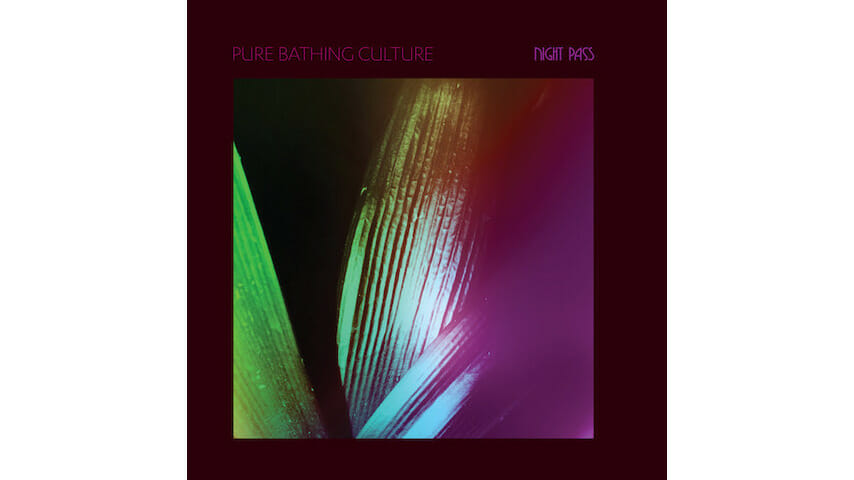If Night Pass, the latest album by Portland, Oregon indie pop outfit Pure Bathing Culture, does only one thing well, it’s demonstrate the band’s style diversity. In ten tracks Pure Bathing Culture showcases an aesthetic best characterized as “versatile,” deploying a sound sculpted from remnants of 1980s yacht rock, borrowing in particular from the likes of Fleetwood Mac and Steely Dan while drawing heavily from the genre’s disco influences; no two songs sound the same even though they’re built from the same sounds. From the opening groove established by “Thin Growing Thing,” to upbeat jams like “Black Starling” and “Devotion,” Night Pass dazzles with the band’s range.
But in ranging far and wide, Pure Bathing Culture runs afoul of a mild identity crisis. As much as the songs making up Night Pass are a distinct pleasure to listen to, they don’t add up to a singular, coherent thesis; put less prettily, the group never manages to define itself through their music. Is this party music, a period throwback record at its best in a club setting where it’s necessary to get people on their feet and dancing? Or is Night Pass a statement piece about the period, where members Sarah Versprille and Daniel Hindman offer comment on the music that drives them? Or is the record just a disparate assembly of tracks that don’t say much when listened in sequence? When the assembly is this much fun, maybe these questions don’t really matter.
The problem with the record’s disunity is that, as the songs roll by the ear, one after the other, they take on the form of cotton candy. They’re sweet, a bit sugary, all fluff. Fluff is fine! Fluff need not be bad, fluff as melodious as Night Pass most of all. But all along the record, there’s a sense that, lying beneath the fluff, Pure Bathing Culture has a message they’re trying to get out. They just can’t. When they do, it’s muddled.
Romance is the talk of Night Pass; this is an album wandering somewhere on the spectrum of desire and devotion, and maybe that’s reason to cut the lyrics, elusive at best, coy at worst, vague at very, very worst, a bit of slack. Love is an ineffable thing. Not that musicians have failed, throughout the course of music history, to find solid ways of describing love, but finding the right combination of words for articulating the push and pull of amorous sensation without tipping one’s hand isn’t easy. “You should lift for love,” Versprille implores her audience as “Thin Growing Thing” fades out. That’s sensible: Love requires lifting, whether you’re the one in love or love is just the concept that you’re trying to preserve.
“You can lift for love and live through something,” she continues, expanding on that notion. What “something” means is never gotten at. Maybe love itself is “something.” “Don’t forget love / it’s a test love / when the best of forgive is forget,” Versprille hums on “Veil,” as if to uphold that argument. Love has to be earned. Lovers have to work for it. Beyond that, Night Pass has a loose grasp on what being in love means, what it entails; there’s a minor throughline of trepidation, traced in “Black Starling” and “All Night,” but Versprille’s words withhold so much that finding solid interpretive ground feels like a fool’s errand. (For all of its poetry and buoyancy, “Black Starling” could as easily be about sneaking around with a paramour in the middle of the night and getting caught by a parent as anything else.)
What Night Pass speaks to with the greatest clarity is the risk of heartbreak. The record derives its title from the penultimate track, “Joyous Lake”: “Wild red roses on their sails / petals for the night pass,” trills vocalist Sarah Versprille, her voice fluttering over an orchestra of echoing guitars, strolling along at andante pace. The song is lugubrious despite its given appellation; it’s a farewell more than a greeting, in keeping with the old expression regarding ships passing in the night, a phrase applied to a brief meeting between two people who, after trading unjustly brief words to one another, part forevermore. If that melancholy is key to Pure Bathing Culture’s work, then it’s a shame not to embrace it. At least they did their listeners the favor of writing music that’s worth listening to regardless of intent.
Boston-based culture writer Andy Crump has been writing about film and television online since 2009 (and music since 2018). You can follow him on Twitter and find his collected writing at his personal blog. He is composed of roughly 65% craft beer.
